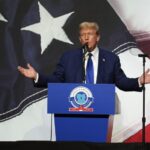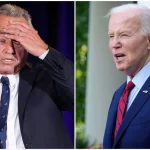
Confusion consumed Nevada this week, with the state holding presidential primary elections Tuesday for the Democratic and Republican parties, while the Nevada Republican Party is holding separate caucuses on Thursday.
Republicans can vote in both the primary and caucuses if they choose, but only Thursday’s caucuses will count toward awarding delegates. What’s more, the candidates will differ in each contest, with former U.N. Ambassador Nikki Haley opting to appear on Tuesday’s ballot in the state-run primary, while front-runner former President Donald Trump is only competing in Thursday’s caucuses two days later.
The move has led to a near-complete desertion of Nevada by 2024 Republican candidates. Most Republicans completely avoided the Silver State during their primary bids, with the exception of former presidential candidate Gov. Ron DeSantis (R-FL), who spent some time campaigning in Nevada before he dropped his White House bid.
The state’s 26 delegates are practically all but certain to go to Trump, whose only competitor in the caucuses is virtually unknown candidate Ryan Binkley. Haley is not in contention for any delegates from the Republican Party due to her decision to participate in the primary, which is run by the state and not the party apparatus.

According to political scientist Josh Putnam of FrontLoadingHQ, the choice of Haley and others to file for the primary, which offers no chance of delegate receipt, was because of “how seemingly locked down Trump has the party-run caucuses.”
He said some campaigns likely thought “it was better to cede the state to him rather than be embarrassed.”
Instead, the primary would be a “symbolic” potential win. “The primary winner will likely have more votes than the winner of the caucuses (if not all the caucus votes combined),” Putnam pointed out. This way, a campaign might be able to tout the win, regardless of delegates, and claim popularity over Trump.
In the last several years, Nevada has held presidential caucuses, similar to those of Iowa, to determine their respective parties’ choices for the Democratic and Republican nominations. But, in 2021, then-Nevada Gov. Steve Sisolak signed a law requiring state-run primary elections for both parties. The law was also meant to make Nevada the first primary in the nation, although this didn’t become the case, as New Hampshire held its primaries last month and South Carolina’s Democratic Party held its own last week.
The Nevada Republican Party was against this move, citing lax election security measures and infringement of voters’ freedom of association protected by the First Amendment. The party sued to stop the Republican primary, but a Carson City, Nevada, judge ruled caucuses and a primary could take place under the law, dealing a blow to the state party. The Nevada Republicans appealed the ruling but ultimately agreed to drop the suit last month.
Nevada Republican Party Chairman Michael McDonald explained in a recent interview with the Washington Examiner, “It’s my goal to make sure that we have some type of voter ID working with the governor and our legislators.” Nevada does not require voters to present identification if their names appear on the list at their polling location.
“If we had voter ID, there wouldn’t be a need for a caucus,” he said. “But if we don’t have any type of voter security, no voter ID, we don’t know who’s getting the ballot. We don’t know who’s filling it out. And we don’t know who’s mailing it in.”
“It’s a participation trophy and competing for a plastic tiara. That’s it,” he said of the primary Tuesday.
The state party’s caucuses have been flagged as a concern for some, who believe the Nevada Republican Party would ensure a Trump win, given the chairman’s history of strong Trump support. McDonald was one of the six Republican electors indicted last year for attempting to overturn Nevada’s election results in 2020 and submitting certification to Congress that Trump had won the state.
However, McDonald has said he wouldn’t be influencing the decisions of any caucusgoers and noted his many invitations to Republican candidates throughout the primary cycle.
Discussing the caucus and primary confusion in his state recently, Gov. Joe Lombardo (R-NV) criticized the party’s move. “I think that’s unacceptable for the voters and the understanding of how things should be done,” he said.
Lombardo, who has endorsed Trump, called the situation “unfortunate.” He added that he’s spoken to the party, but conversations are “falling on deaf ears.”
CLICK HERE TO READ MORE FROM THE WASHINGTON EXAMINER
One option on Nevada’s primary ballots is “none of these candidates,” which the state’s Republican Party is reportedly urging voters to choose, punishing any Republicans who chose to participate in the state-run election instead. The option is on the ballot due to a 1975 state law requiring it. If the option were to beat out Haley and other Republicans, it wouldn’t be the first time it triumphed. “None of these candidates” notably received a plurality of votes in the 2014 Democratic gubernatorial primary election.
Lombardo has already declared his intention to vote for the option ahead of the Republican primary. He will also caucus for Trump later this week.





